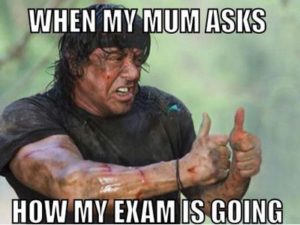
So, you want to be a diplomat? The Philippine Foreign Service Officers Examination, or “FSO Exam” for short, is the exam you have to pass if you want to be a Philippine foreign service officer, or what in layman’s terms can be called a diplomat. The FSO Exam is touted by many as the most difficult exam in the entire Philippine bureaucracy. The passing rate is much lower than the lawyer’s bar or any engineer or medical board exams. The exam is said to be so difficult that it is rumored that there was even one year where no one passed.
Over the years I’ve been in the foreign service, I’ve had my fair share of friends and friends of friends who’ve approached me asking me for tips and to share experiences on the FSO Exam. Some have even gone out on a limb to ask me to help them prepare for the exam. Being a naturally helpful fellow, I’ve always tried my best to help. And after all, I consider myself lucky that I am in the foreign service at all, and helping others get through this grueling exam is my way of paying it forward.
So if it’s so hard, what is the passing rate of the exam?
I’d guesstimate that the exam typically has a passing rate of around 1-3%. I don’t have a large data set to present so let’s go by some rough numbers. The FSO exam is given yearly. In a typical year you’d usually have a thousand takers, give or take a few hundred. From this number it is not out of the ordinary to have less than 10 people who make it until the end. Though it seems now-a-days more than 10 to around 20 passers a year is more common. As I mentioned, it is rumored that there was even a year where no one passed. Whether this is true or not, it just shows the exam’s fearsome reputation.
(I think what happened is that there indeed was a year no one passed, so the board [Board of Foreign Service Examinations] decided to lower the score so at least there would be a few passers for that year – again this is what I heard, word of mouth.)
Such a fearsome reputation for an exam is all in all not that bad. For one, for those who did pass, it puts a higher value on their achievement. And on the flip-side, for those who did not pass, it helps soothe hurt feelings.
Let’s use some numbers to get a more detailed look into the FSO exam’s passing rate. While all of this is public record, let me trawl the internet for statistics for you. According to this news report, in 2012 there were 9 successful examinees out of an batch of initial 534, that means the passing rate that year was 1.7%. In 2011 according to this successful taker, out of 628 examinees only 9 passed, putting the passing rate that year at 1.4%. It’s also a know fact that there was a year where out of a couple of hundred takers there were only three passers, one of whom was the daughter of former President Macapagal-Arroyo.
Of course this 1-3% passing rate is just my flimsy guess. It can go lower or higher. In my own batch of exam takers in 2007, we had an anomalously large batch of 31 passers (we were the second largest ever at the time) out of more than 800 takers (I forget the exact figures now), giving us a passing rate of around 3.7%. Meanwhile, this successful taker notes that during his year (around 2004) out of around 1,250 takers only 12 passed giving his year’s passing rate as around 0.96% or less than 1%.
Why are you having such a hard time giving me a passing rate?
The FSO exam is a long-drawn out selection process given in five different stages or tests. These stages are given out in the course of a full year, or sometimes even longer (in my batch it took 2 years). And whenever the results of each stage are published, they usually just list down the names of examinees who were able crawl through to the other end of that particular stage, without mention on how many overall takers there were at the start.
Thus, I have to rely on what little data I can scrape up online and on my own too fallible memory.

Don’t I have to be a lawyer or be something like an International Relations graduate before I can take the FSO Exam?
You do not have to be a lawyer or have any kind of fancy degree. In fact, any four year college degree course satisfies the minimum required educational background. Whether it be a Bachelor’s Degree in Nursing, Music, Engineering, or Zoology, it’s all good.
Aside from having a Bachelor’s Degree, you are also required to have at least two years of combined work experience or further studies. So, if you worked for two years after college, or took up your Master’s for two years, or did one year of work and one year of studies you’re eligible.
Of course, you must be a Filipino citizen if you want to a Filipino diplomat. And, you should not be more than 35 years of age on the first day of the first exam (Qualifying Test).
Important Update (Nov. 3, 2017): This year they finally removed the age limit! Don’t believe it? Neither would I. Check out this DFA announcement for the 2018 FSO Exam.
Another Important Update (Nov. 11, 2017): Naturalized Filipino citizens are now permitted to apply. Previously, only natural-born citizens were allowed to take the FSO Exam. This was pointed out by this blogger. Thanks, bud.
For a couple of years now, applicants have also been required to be “permanent residents” of the Philippines. This is debatable, because it is a bit tricky to define what constitutes permanent residency in the Philippines for a Filipino national. While what I’m saying is by no mean definite, as the last say on matters related to the exam fall upon the DFA’s Board of Foreign Service Examinations, it can be interpreted that as long as you do not have long-term or legal permanent residence status in another country, such as for example US permanent residence, you should be eligible to take the exam. For the majority of aspirants who live and work in the Philippines though, this “permanent residency” thing is a non-issue, of course.
So, is it normal for me to take the FSO Exam even if the college course I took is unrelated?
Yes. The poster above this article was made by DFA to help it recruit FSO Exam examinees. As you can see, in the foreign service corps there are nurses, ballet dancers, soldiers, and radio hosts. I know that there are even priests, musicians, computer engineers, and competitive pistol shooters.
I remember fondly that during the oath-taking ceremony of my batch just after we had passed the exams and were being sworn in as foreign service officers, the Secretary of Foreign Affairs said in his keynote remarks “The foreign service corps is increasingly multidisciplinary. In fact, this batch has a Doctor in Chemistry. Can you believe that? And why… this batch even has a… Bachelor in Physical Education” (there was an audible gasp from the audience).
And I smiled to myself “Yeah, that’s me alright.” while I leaned against the two crutches I’ve been using as a support after ligaments in one of my knees were ripped by a wily Japanese grappler who caught me in a nasty leglock in an underground MMA competition a couple of weeks back.

How long is the exam?
The exam is made out of five test given over a one year period. You have to pass each exam to make it to the next part; if you fail one test you are no longer allowed to continue. They are given in this order: Qualifying Test, Preliminary Interview, Written Test, Psychological Test, Oral Test.
Let’s examine each part a little more up close.
I. Qualifying Test
This exam is made by the Civil Service Commission and is said to be like the civil service exam but only on steroids… lots of steroids. It contains mathematics (oh no, not again!), reading comprehension, grammar, logic, and lots of other high-school and basic college education stuff. This very lengthy half-day exam (usually 8am – 12nn) seems to be designed not to be finished and you’ll be under tremendous time pressure. A lot of people I know, myself included, had to rely on the old “shotgun” method for quite of number questions since there wasn’t enough time to answer them all. It seems to be as much of a test of mental tenacity as it is ability.
By the way, I haven’t taken the civil service exam. You don’t need to take the civil service exam to be a foreign service officer.
Since the exam is made by the Civil Service Commission and is said to be like the civil service exam, it would be logical to prepare for the Qualifying Test the same you would prepare for the civil service exam. There are lots of excellent civil service reviewers available in bookstores and online so I suggest getting a whole lot of them and trying them all out.
Most people get hacked away (fail) during this part of the FSO exam so prepare for it well. More on this later.
II. Preliminary Interview
As a disclaimer, I did not take the Preliminary Interview part of the FSO Exam since it was introduced just very shortly after I had taken the exam at 2007. But I of course went through all the other parts of the FSO Exam.
This is what I hear from people who’ve been through the interview and from colleagues who themselves have been panelists. The panelists in the interview will be active officers in the foreign service corps. Three panelists will conduct the interview and will ask you questions to get a better sense of your background, what you know and what skills or knowledge you can contribute to the foreign service. Being essentially a job interview, the panelists will try determine whether or not you’re good fit for the work that lies ahead. And just like any job interview, they may ask your personal life, your professional life, and everything in between. Sans waiting time, the interview is said to take around 20 minutes or less.
Be ready to answer questions like: “What do you do in your current job?” or “What can you contribute to the DFA?” But you can also be asked stumpers like “What can be done to ensure a meritocracy in DFA?”
III. Written Test
The Written Test is a three day essay-type exam, with each day lasting from 8am – 4pm. If the Qualifying Test is made by the Civil Service Commission, and the Preliminary Interview is done by officers in the foreign service corps, the Written Test is made by the academe.
And indeed the questions can get very academic, such as “Define and discuss the relevance to the Philippines of the following: AFTA, NAFTA, LAFTA, EU, APEC, and EAEC.” or “Define Realpolitik and describe how this principle is evident in the strategies of Otto Von Bismarck and Camillo di Cavour.”
Over the three days, the Written Test will test your mettle on the following: English (20%), Filipino (5%), Philippine Political, Economic and Cultural Conditions (30%), International Affairs (20%), World History (20%), Foreign Language (5%).
Here is a bunch of the questions that came out in a previous Written Test that someone posted on Scribd a few years back.
As we can see from the sample questions, it is virtually impossible to cover everything that might be taken up in the Written Exam, so learn how to answer in the best way possible using what knowledge you do have. And be prepared for cramped up hands by the end of the three days.
Three days of non-stop essay writing! Hurray!!!

B: You do realize this in an essay-type exam, right?
IV. Psychological Test
This test is done at the Philippine Mental Health Association, usually in small batches or pairs in one day from 8 am to 3 pm. You’ll be evaluated both on your mental abilities and your psychiatric health. If you’ve made it this far, I assume your mental abilities would be up to par. The assessment your psychiatric health however is another matter. This test is meant to weed out those who are not psychologically fit to endure the pressures of serving abroad in high-profile situations.
You’ll be put through a battery of psychiatric tests, which may be familiar to many of you. For example, you have to complete sentences that go something like “When I am upset about a situation I have no control over ________” or ask you’ll be asked to draw a picture of a person.
In the last part, you have a brief talk with a psychiatrist.
While not everyone will take this test seriously, let it be known that there are people who get axed at this point. In one batch, it was reported that 12 out of 24 people didn’t pass the Psychological Test.
Now how do you prepare for such an test? I had a colleague who said one shouldn’t worry about the Psychological Test so much. All you have to do is just answer the questions of the psychiatrist as any normal person would. For example, if asked to fill in the blanks “My father is ______.” just say what a normal, rational man would. Something like “My father is a good man” or “My father loved us very much”.
But then I retorted “But what if you have the urge to say something crazy like ‘My father is a monkey.’ or ‘My father is an alien from outer space.’?”
She said “Well, if you really are crazy, then you wouldn’t know ‘My father is a monkey’ is something crazy to say.”
So in short, don’t worry, be yourself and be natural (or at least try your best to suppress those voices in your head and/or feelings of infinite, consuming despair on that day… hehe, kidding).

V. Oral Test
This test is divided into three main parts given over two or three days. The panel interview, group dynamics, and the formal dinner. The Oral Test is where you finally face the big bosses of the metaphorical video game. The panelists in the Oral Test will mostly likely be a mix of retired ambassadors, top-level officials from the Department of Foreign Affairs, big time officials from other branches of the Philippine bureaucracy, such as the Department of Trade and Industry and Department of Education, and other top honchos.
Before the Oral Test, you would have been asked to submit an answer sheet in so many copies where your fill out your basic information, educational and work background, awards and honors, and other such stuff you’d put in a curriculum vitae. You’ll also be asked to write essays on your current employment, greatest achievement, your weaknesses, problem resolution methods, and so on. But remember the Miranda rights – that thing what the cops on TV say when they go busting down doors to arrest the bad guys, “anything you say can and will be used against you”, except when test time comes around you will not have the right to remain silent.
During the panel interview you will be interviewed by perhaps 8-10 panelists for anywhere between 10 to 20 minutes. Entering the interview room with the entire panel staring you down with there serious-looking, grizzled faces, like ravenous wolves sizing you up for dinner, can be very intimidating. It’s a nerve-wracking experience, and though it might just last a few minutes, it can feel like it lasted for hours.
Be prepared for no-holds-barred, all hell breaks loose kinds of questions. “Are you married?” “Why not?” “Are you gay?” “Are you willing to sacrifice being with your family for your career?” They may ask you about your work experiences. They may ask you about current international affairs. They will test your knowledge. They may talk to you about politics. Anything goes. Some of the panelists may intentionally try to belittle and unnerve you. Keep your calm.
They’ll try poke holes in the curriculum vitae and essays which you submitted. For example, if you wrote down you spoke French, be prepared in case one of the retired ambassadors in the panel who was once assigned to a Francophone country starts talking to you in French.
Not all is dark and dreary. I found out that the panelists can also save you. I entered my panel interview planning to highlight my work in the corporate world since I noticed that very few of my fellow examinees had corporate jobs or experience. However, just as I expected my Physical Education degree stood out too well and it was attacked by the panelist. They threw in the customary jokes on how martial arts can be used when things go wrong in diplomacy. Somewhere along the way, because the panelists started asking me about Judo (I’m a two-time collegiate [UAAP] Judo champion), the name Vladimir Putin tumbled out of my mouth as an example of statesman that was also very good in Judo. And as you can imagine, that didn’t go so well. I tried my best to stand my ground but I was met with disapproving looks and more condescending questions. However, one of the panelists, who I found out later on was a DFA Undersecretary, perhaps seeing I was being picked on, suddenly made a pivot and addressed the panel in my defense. He gave a short talk on “Sports Diplomacy” and gave the example of the Ping-pong Diplomacy between the US and China during the height of the Cold War. God bless his soul.
After the panel interview is the Group Dynamics part. The examinees are divided into small groups and are given topics which they are suppose to discuss or debate on. During my time, one of the topics given to us was how to improve the Philippine Education system, which was tricky considering a high-ranking Department of Education official was in the panel. I remember one of the panelist telling us how much he hated lawyers in the DFA since “they’re nitpickers and nothing gets done” and he wanted us to discuss whether or not lawyers should be allowed in the foreign service. I later found out he was a lawyer himself. At another time, a panelist asked me out of the blue “Do you jog?”
Once the Panel Interview and the Group Dynamics are done, it’s time for the Formal Dinner. Ah! Attending a classy party, the quintessential work of a diplomat! (Aside from from writing reports and other humdrum stuff which most diplomats/foreign service officers do 98% of the time.)
This exciting part is the culmination of the FSO Exam. The Formal Dinner is usually held in a five star hotel, such as the Diamond Hotel in Manila. The whole exercise is meant to be a field test on how you will do in a super formal social event and so they try to make everything as close as possible to a real thing, but only perhaps the pressure on the examinees to put a good impression on people is a million times over than what you’ll normally feel. Everyone will be dressed up in their best barongs and Filipiniana gowns and you will feel the pageantry in the air. You’ll be graded on how well you make small talk and hold conversations, your table etiquette including the proper use of silverware, how well you ‘win friends and influence people’ and other diplomaty things diplomats do.
I’ll share my experience with the formal dinner. Like in a real life formal event, it started with a reception. The examinees filed into the reception room for cocktails. The panelists were there waiting for us. The examinees, perhaps the panelists too, tried their best to look relaxed. Some examinees immediately pounced on the opportunity to cozy up to the panelists and began engaging them in conversation meant to display their intellect. I felt it was too early in the evening and tried to keep a low profile.
Then, it was announced dinner was ready to be served and we were led to the dining room where we had assigned seats. Each table had panelists/examiners mixed in. Reviewing your table etiquette, such as which utensil to use and when, will save you a lot of stress and imitating people who seem to know what they are doing. Put your best foot forward when chatting with your tablemates.
And finally towards the end part of the dinner, the coup de grâce, the dreaded impromptu speech. When your turn comes, you have to randomly pick out a topic from the fishbowl/receptacle. You’re given a minute or two to prepare, then you’re thrust onstage to give an impromptu speech. It may vary, but expect being given a five-minute time limit.
You might be asked to make a speech promoting of Philippine soap operas overseas. You might be asked to give a speech on Piracy and Maritime Security. In many of the of the topics you will be asked to play the role of a diplomat in a certain situation and you are asked to deliver a speech appropriate to it. For example, you are asked to pretend your are the Philippine Ambassador to Japan and you will address the business community on JPEPA. Some of topics will just blow your mind. “Discuss track two and track three diplomacy.” or “Discuss repercussions of LAFTA on the Philippines.” Be prepared in case you end up a fish out of water, for example you are asked to discuss the life and works of a national artist you’ve never heard of before.
The topic I randomly picked out of the fish bowl was something like “You are the Philippine Ambassador in Stockholm hosting a reception celebrating the anniversary of the establishment of diplomatic relations. Give a short speech.”
I mentioned that Sweden and the Philippines are vastly different countries with very different economies, geographies and cultures. One is landlocked and mountainous, with a cold, temperate climate. Meanwhile, the other is a lush archipelago in the warm tropical seas. This makes both countries complementary. To make a good marriage opposites are need. The relationship between Sweden and the Philippines is like a marriage between a man and a woman. Because both countries have very different strengths, weaknesses and products, there is much potential for trade and cooperation. I ended with a joke “I hope that this marriage between the Philippines and Sweden will produce many children.” The audience laughed. Ding! I felt I struck my mark.

Hehe, okay that was kinda cheesy, but finding royalty-free images isn’t really that easy, y’ know.
Duke’s Five Golden Tips to Help You Pass the FSO Exam
Here it is, my golden tips to help you pass the FSO Exam. Of course, you are probably asking yourself “Will they really help me pass the FSO Exam?” I don’t want to say they will but some of what I’ll suggest is counter-intuitive and goes against the conventional grain of advice given to FSO hopefuls. So, I’ll leave it up to the reader to decide whether they will work for you or not.
Who knows, maybe out of the five tips one of them is totally incorrect and misleading. (haha, got you there, just kidding, they’re all from the bottom of my heart)
And also, just so I won’t get a sternly worded memorandum from our Human Resources office, let me state these tips are totally my own and do not reflect the DFA or me in an official capacity in any way. These tips are just what I’d say to you if I bumped into you at a coffeeshop and you asked for my personal take on how to pass the FSO exam.
TIP # 1: The most important part of the exam is the written qualifying exam.
I think this is where most people get screwed flummoxed.
What happens to the majority of FSO Exam takers? They don’t fail in the written or oral exam. Why? Because they simply don’t get there. It is during the Qualifying Test where you get from 900 hopefuls to 90. 80-90% percent of examinees are axed at the Qualifying Test, and going by this statistic, you can deduce that the most strategic thing to do is prepare for the Qualifying Test.
I know some really brilliant minds who totally outclass me intellectually but did not pass the Qualifying Test, perhaps because there were out of practice answering really long school-type exams or made a misjudgment in their time management.
You might go to a review center or be a member of a review group and you’ll spend all day and night focusing on the heavy stuff, like international relations, economics, history and other mind-bending topics. This is all good. But be sure you also allot time focused on preparing for the Qualifying Test.
Of course, once you pass the Qualifying Test start focusing on the Preliminary Interview and the Written Test and go full speed ahead studying all this mind-bending fancy diplomat stuff.
TIP # 2: Read the News Everyday NOT!
Instead of ‘following the news’, study current events.
An often repeated piece of advice given to FSO hopefuls is that you should read the news to keep in touch with current events. I think however following the news is different from studying current events. Yes, keeping abreast of the news is important to be a fully-functioning, responsible member of society, but there is no need to doggedly follow each news story that newspapers fill their pages with. Newspapers make money filling out their space with whatever catchy tidbits their reporters can scrape up.
My main bone of contention with watching the news or reading the papers is that is that it’s too easy for it to become a time vacuum. It’s too easy to be muddled by all the facts and twists of the storyline. Believe me, I’ve done my share of following the news when I was preparing for the FSO Exam. I used to go the call center I worked at with a folder full of newspaper articles pasted on bond paper which I’d pin on the walls of my cubicle so I could study them during my breaks. (Yeah prehistoric, I know, but this was just right before the smart phone era.) I realized soon enough that it wasn’t a good return for my time.
Your time is better spend time reading quality articles that analyse and go in-depth on current issues. Go for articles from reputable sources that see the forest instead of the trees. Focus on major international and domestic issues and know enough about each that you can explain each issue in a good 8-10 sentence paragraph.
TIP # 3: Mock Exams
Mock exams are a great way to simulate as close as possible what you think the exam will be like. Practice makes perfect, whether you’re talking about ballroom dancing, shooting pistols, parenting, raising dogs or singing karaoke. Taking an exam is no different. Try make your mock tests as realistic as practically possible. Try put in place the conditions that will help you get used to the stress levels and feelings of hopelessness and utter despair you might feel on exam day itself.
It’s not enough to read. Write. You maybe quite surprised to find out that even for subjects that you think you know well, you will have a hard time putting what you actually know in a concise, coherent manner.
For the Qualifying Test you might want to consider buying civil service exam reviewers and other kinds of general education reviewers (like UPCAT reviewers) and practice answering them as fast as you can against a running clock. If you’re preparing for the Written Test take time to actually write everyday. Even the difficulty of writing with a pen for several hours straight is very easily underestimated, and towards the final hours of the day, cramped hands can be a factor. If you’re practicing for the Preliminary Interview or the Oral Test, get someone to assign you topics and speak to them. You get my gist.
Tip # 4: Learn to answer questions you don’t know how to answer
Focus on what you don’t know.
It sounds like a no-brainer tip but when you come to think about it, we like to focus on the parts where studying is enjoyable or not as boring as parts we don’t like. For those preparing for the Qualifying Test, you have to learn those skill you don’t know. Do you suck at math? Get over it. Study math. The passing score of the Qualifying Test is 80%. That means that four out of five questions must be correct. So every question does count. If you want a good chance at passing, you have to leave a few as possible to the proverbial “shotgun”.
Practice writing essays to questions you absolutely have no idea what they are talking about. Ask a trusted friend to give you some really difficult questions on topics you are unfamiliar with.
TIP # 5: The Foreign Language part is only 5%
This tip is for those who are preparing for the Written Test. The Foreign Language part of the Written Test is 5%. As you can see I struck out the word only. Why? Because you can think about the Foreign Language part in two ways.
One way to think about it is because it’s only 5% there isn’t any need to focus on it, and your energies are better spent going after the big topics like History or International Relations. This is correct if you have a firm grounding on the foreign language you signed up for.
The other way to think about it is to consider it a good opportunity to do well in 5% of the exam, because this is one of the few parts of the FSO Exam which you will be able to more or less predict what they’ll ask. For sure you know you will be tested on basic grammar rules, without speaking or listening comprehension. This greatly narrows the scope of what you have to learn.
Being a language geek, it pains me a lot to say this but be careful how you use your time studying a foreign language if your sole aim in learning it is to help you pass the FSO Exam. Focus on learning the basic grammar and practical vocabulary. Have the ability to write a short paragraph about yourself or everyday topics. Studying other aspects of the language, such as listening comprehension and actual speech, can also be a huge sink for your precious time.
You will be asked to choose beforehand one language: Arabic, Bahasa Indonesia, Mandarin Chinese, French, German, Japanese, or Spanish. If you don’t have a background in any of these foreign languages and don’t have a particular inclination towards any of them either, you might want to go with Spanish. This way you’ll have a whole lot of loan words from Tagalog which you can lean on, and there’s no need to learn a new script or set of characters. With one good condensed text book you can cover a lot of grammatical rules in a relatively short period of time.
In conclusion…
So do you think you have a chance? After all, I am a Bachelor in Physical Education graduate but I passed. I had a friend who once joked my major was in Wrestling and my minor in Fencing. Wrestling and Fencing aren’t in any of the FSO Exam parts the last time I checked. I’m sure many of you are much more well-grounded than I when it comes to the kind of knowledge one needs to pass the FSO Exam. What is important is preparing for the exam in strategic manner to make the most of your limited time and energy.
And, if you fail… hey so what? It’s just a stuffy old exam after all and being a diplomat is just one of the many jobs that are available for bright minds like yours. And in fact, if you do take it and you do fail, that’s the best preparation you can do for next year’s exam. Kick your ego in the nads and go like Nike and “Just do it.”
As a bonus, let me throw in my Golden Tip # 6: Take the the FSO Exam this year. Waaaayyyy too many people aspiring to be foreign service officers think “This year, I’m not ready.” and “Next year I can do better. I’ll take it next year.” Hey, look at yourself in the mirror. You’ll never be ready for an exam like this. If being a foreign service officer is really what’s in your heart, take the darn exam. Life is too short. Learn from it. And, if you have to, take it again.
Fall off your horse seven times, get back up eight.
In the end, if I can inspire at least one person reading this article to take the FSO exam, where he or she succeeds or not, I would have met my goal.

P.S. I have to give a shout out to my mom to thank her for encouraging me to take FSO Exam and believing I could pass it since day one. It was the second best career advice I ever got in my life. (The best career advice I ever got was also from my mom who said “If you really aren’t happy anymore just leave.” but more on that another time.)
Pop Quiz: What’s the difference between and embassy and a consulate?